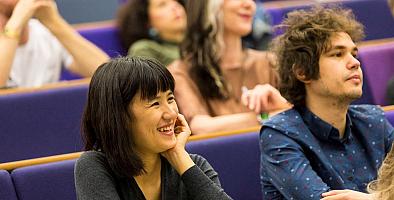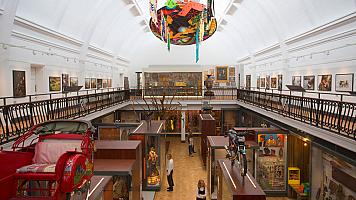MA
Visual Anthropology
Content navigation menu
Why study MA Visual Anthropology at Goldsmiths
The MA Visual Anthropology offers a unique combination of anthropological theory and visual practice. It provides you with a strong foundation for producing visual work informed by anthropology.
- You’ll approach visual anthropology through the study of the politics and aesthetics of representation, documentary and ethnographic film, and anthropological perspectives on art.
- As a practice-oriented MA, there is a clear emphasis on applying anthropological knowledge to the actual making of visual artefacts, and not just their analysis.
- The MA is open to people with a range of backgrounds in anthropology and related fields, so you’ll join a diverse group of students with varying perspectives.
- As a graduate, you’ll be well-placed to pursue a career in visual anthropology (be it research- or practice-oriented), and to bring an anthropological sensibility to the visual to other disciplines.
- You’ll have hands-on training in the use of digital camcorders, sound recording equipment and video editing, preparing you for your final visual project – a 20-minute film – as well as giving you practical vocational skills for after you graduate.
- You'll learn from leading academics in the Department of Anthropology, which has been rated top 10 in the UK for anthropology in the QS World University Rankings by Subject 2024.
Contact the department
If you have specific questions about the degree, contact Dr Ricardo Leizaola.
Length
1 year full-time or 2 years part-time
Fees
Home - full-time: £13600
Home - part-time: £6800
International - full-time: £26250
Department
What you'll study
You'll study the following compulsory modules:
| Module title | Credits |
|---|---|
| Ethnographic Film and Cinema Studies | 30 credits |
| Directions and Diversions in Visual Anthropology | 30 credits |
| Anthropology of Art | 30 credits |
| Anthropology Video Production | 60 credits |
Teaching style
This programme is taught through scheduled learning – for example, through a mixture of lectures and seminars. Depending on the option module you select you may also learn via workshops, film screenings and reading groups. You’ll also be expected to undertake a significant amount of independent study.
Careers
The unique combination of theory, research and practice that structures the MA in Visual Anthropology will prepare you for a diverse range of employment opportunities. Past graduates have gone on to work in:
- Video production, both commercial and independent
- Film editing and videography
- Production and programming of film festivals
- Ethnographic and visual research in both academic and commercial settings
- Teaching
In addition, you can use this programme as a springboard for further study, either vocational or intellectual (including entry into MPhil/PhD programmes).
In short, the multiple skills – intellectual, critical and creative – developed by the MA in Visual Anthropology will provide you with the flexibility of thought and approach necessary for the global job market.
Skills
Some of the skills you'll develop during the Masters include:
- Critical thinking
- Research skills
- Visual production skills, including practical skills in the use of digital camcorders, sound recording equipment and video editing
- Collaboration and team work
- Independent working
- Communication skills
Entry requirements
You should have (or expect to be awarded) an undergraduate degree of at least upper second class standard in a relevant/related subject.
You might also be considered for some programmes if you aren’t a graduate or your degree is in an unrelated field, but have relevant experience and can show that you have the ability to work at postgraduate level.
International qualifications
We accept a wide range of international qualifications. Find out more about the qualifications we accept from around the world.
If English isn’t your first language, you will need an IELTS score (or equivalent English language qualification) of 6.5 with a 6.5 in writing and no element lower than 6.0 to study this programme. If you need assistance with your English language, we offer a range of courses that can help prepare you for postgraduate study.
Fees and funding
Annual tuition fees
These are the PG fees for students starting their programme in the 2025/2026 academic year.
- Home - full-time: £13600
- Home - part-time: £6800
- International - full-time: £26250
If your fees are not listed here, please check our postgraduate fees guidance or contact the Fees Office, who can also advise you about how to pay your fees.
It’s not currently possible for international students to study part-time under a student visa. If you think you might be eligible to study part-time while being on another visa type, please contact our Admissions Team for more information.
If you are looking to pay your fees please see our guide to making a payment.
Funding opportunities
Explore the Goldsmiths scholarships finder to find out what funding you may be eligible for.
If you are a UK student you may be eligible for a postgraduate loan.
Meanwhile our Careers Service can also offer advice on finding work during your studies.
Paying your fees
Find out about paying your tuition fees.
Additional costs
In addition to your tuition fees, you'll be responsible for any additional costs associated with your course, such as buying stationery and paying for photocopying. You can find out more about what you need to budget for on our study costs page.
There may also be specific additional costs associated with your programme. This can include things like paying for field trips or specialist materials for your assignments. Please check the programme specification for more information.
How to apply
You apply directly to Goldsmiths using our online application system.
To complete your application, you will need to have:
- Details of your academic qualifications
- The email address of your referee who we can request a reference from, or alternatively a copy of your academic reference
- Copies of your educational transcripts or certificates
- A personal statement
You'll be able to save your progress at any point and return to your application by logging in using your username/email and password.
When to apply
We accept applications from October for students wanting to start the following September.
We encourage you to complete your application as early as possible, even if you haven't finished your current programme of study. It's very common to be offered a place that is conditional on you achieving a particular qualification.
Late applications will only be considered if there are spaces available.
If you're applying for funding, you may be subject to an earlier application deadline.
Selection process
Admission to many programmes is by interview, unless you live outside the UK. Occasionally, we'll make candidates an offer of a place on the basis of their application and qualifications alone.
Further guidance
Read our guide to applying for a postgraduate degree at Goldsmiths.






